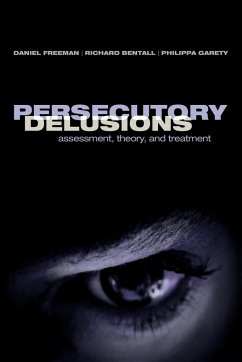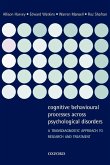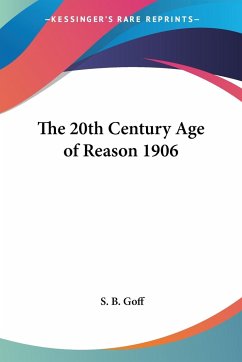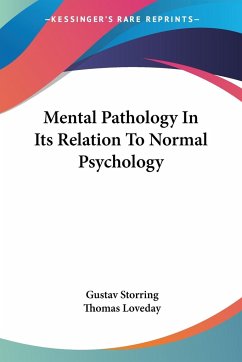Persecutory Delusions
Assessment, Theory and Treatment
Herausgeber: Bentall, Richard; Garety, Philippa; Freeman, Daniel
Persecutory Delusions
Assessment, Theory and Treatment
Herausgeber: Bentall, Richard; Garety, Philippa; Freeman, Daniel
- Broschiertes Buch
- Merkliste
- Auf die Merkliste
- Bewerten Bewerten
- Teilen
- Produkt teilen
- Produkterinnerung
- Produkterinnerung
Delusions of persecution are common in conditions such as schizophrenia, but they also affect 10-20% of the general population. In this landmark book, the three major authorities in the field bring together the current knowledge about the assessment, understanding, and treatment of persecutory delusions.
Andere Kunden interessierten sich auch für
![Extraordinary Popular Delusions Extraordinary Popular Delusions]() Charles MackayExtraordinary Popular Delusions23,99 €
Charles MackayExtraordinary Popular Delusions23,99 €![Cognitive Behavioural Processes Across Psychological Disorders Cognitive Behavioural Processes Across Psychological Disorders]() Allison HarveyCognitive Behavioural Processes Across Psychological Disorders91,99 €
Allison HarveyCognitive Behavioural Processes Across Psychological Disorders91,99 €![Textbook of Abnormal Psychology Textbook of Abnormal Psychology]() Roy Melvin DorcusTextbook of Abnormal Psychology34,99 €
Roy Melvin DorcusTextbook of Abnormal Psychology34,99 €![The Price of Silence: A Mom's Perspective on Mental Illness The Price of Silence: A Mom's Perspective on Mental Illness]() Liza LongThe Price of Silence: A Mom's Perspective on Mental Illness13,99 €
Liza LongThe Price of Silence: A Mom's Perspective on Mental Illness13,99 €![Personality: How It Forms Personality: How It Forms]() Henry KellermanPersonality: How It Forms28,99 €
Henry KellermanPersonality: How It Forms28,99 €![The 20th Century Age of Reason 1906 The 20th Century Age of Reason 1906]() S. B. GoffThe 20th Century Age of Reason 190623,99 €
S. B. GoffThe 20th Century Age of Reason 190623,99 €![Mental Pathology In Its Relation To Normal Psychology Mental Pathology In Its Relation To Normal Psychology]() Gustav StorringMental Pathology In Its Relation To Normal Psychology22,99 €
Gustav StorringMental Pathology In Its Relation To Normal Psychology22,99 €-
-
-
Delusions of persecution are common in conditions such as schizophrenia, but they also affect 10-20% of the general population. In this landmark book, the three major authorities in the field bring together the current knowledge about the assessment, understanding, and treatment of persecutory delusions.
Hinweis: Dieser Artikel kann nur an eine deutsche Lieferadresse ausgeliefert werden.
Hinweis: Dieser Artikel kann nur an eine deutsche Lieferadresse ausgeliefert werden.
Produktdetails
- Produktdetails
- Verlag: OUP Oxford
- Seitenzahl: 450
- Erscheinungstermin: 17. Juli 2008
- Englisch
- Abmessung: 234mm x 156mm x 25mm
- Gewicht: 679g
- ISBN-13: 9780199206315
- ISBN-10: 0199206317
- Artikelnr.: 23816520
- Herstellerkennzeichnung
- Libri GmbH
- Europaallee 1
- 36244 Bad Hersfeld
- gpsr@libri.de
- Verlag: OUP Oxford
- Seitenzahl: 450
- Erscheinungstermin: 17. Juli 2008
- Englisch
- Abmessung: 234mm x 156mm x 25mm
- Gewicht: 679g
- ISBN-13: 9780199206315
- ISBN-10: 0199206317
- Artikelnr.: 23816520
- Herstellerkennzeichnung
- Libri GmbH
- Europaallee 1
- 36244 Bad Hersfeld
- gpsr@libri.de
Daniel Freeman is a Wellcome Trust Fellow at the Institute of Psychiatry, King's College London, and a consultant clinical psychologist in the South London and Maudsley NHS Trust. He publishes prolifically in the leading international journals, makes regular keynote addresses at international conferences, and is an Associate Editor of the British Journal of Clinical Psychology. He studied natural sciences at Cambridge University, specialising in experimental psychology, and has completed doctorates in psychology and clinical psychology at the Institute of Psychiatry, King's College London. He is the lead author of Overcoming Paranoid and Suspicious Thoughts, the first self-help book for people affected by suspicious thoughts, and has recently written a popular science book on paranoia, Paranoia: The 21st Century Fear Richard Bentall attended the University College of North Wales, Bangor as an undergraduate (1975-9) before taking a Ph.D. in experimental psychology at the same institution (awarded 1983). Moved to the University of Liverpool to obtain a qualification in clinical psychology (1984) before later achieving a part-time MA in philosophy applied to health care from University of Wales, Swansea (1989). Returned to Liverpool to work as a lecturer (1986) after a brief stint working for the National Health Service as a forensic clinical psychologist (1984-1986). Was appointed professor at Liverpool (1994) before moving to the University of Manchester (1999) and then returning to the University of Bangor (2007). Research interests include psychological processes involved in psychotic symptoms (e.g. hallucinations and delusions) and the psychological treatment of severe mental illness. Philippa Garety studied Philosophy and Psychology (Natural Sciences) at Cambridge University in the 1970s, then undertook clinical psychology training at the Institute of Psychiatry, London, followed by a PhD. Since then she has combined clinical practice in the NHS with research. Her main focus of research has been the investigation of cognitive processes in psychosis, particularly reasoning and affective processes in delusions, together with the development of psychological treatments, such as Cognitive Behavioural Therapy (CBT). She is interested in translating the findings of theoretical and empirical research into improvements in treatments and service provision. Her current post is as Professor of Clinical Psychology at the Institute of Psychiatry, King's College, London and Head of Psychology for the South London and Maudsley NHS Foundation Trust.
* 1: Peter Chadwick: A personal account
* Assessment, Epidemiology and Prognosis
* 2: Daniel Freeman: The assessment of persecutory ideation
* 3: Bart Rutten, Jim van Os, Mari Dominguez and Lydia Krabbendam:
Epidemiology and social factors: findings from the Netherlands Mental
Health Survey and Incidence Study (NEMESIS)
* 4: Martin Harrow, Thomas Jobe and Ellen Astrachan-Fletcher: Prognosis
of persecutory delusions in schizophrenia: a 20-year longitudinal
study
* 5: Jayne Taylor: Violence and persecutory delusions
* 6: Alistair Munro: Persecutory delusions in the setting of delusional
disorder
* Theory - Psychological Processes
* 7: Daniel Freeman, Philippa Garety and David Fowler: The puzzle of
paranoia
* 8: Richard Bentall, Peter Kinderman and Michael Moutoussis: The role
of self-esteem in paranoid delusions: The psychology, neurophysiology
and development of persecutory beliefs
* 9: Dennis Combs and David Penn: Social cognition in paranoia
* 10: Rhiannon Corcoran and Suzanne Kaiser: Persecutory delusions and
theory of mind: long-standing debates and emerging issues
* 11: Robyn Langdon, Ryan McKay and Max Coltheart: The cognitive
neuropsychological understanding of persecutory delusions
* Theory - Biological Processes
* 12: Marc Laruelle: Dopamine and persecutory delusions
* 13: Cécile Henquet, Marta Di Forti, Robin Murray and Jim van Os: The
role of cannabis in inducing paranoia and psychosis
* 14: Matt Broome and Philip McGuire: Imaging and persecutory delusions
* Treatment - Overviews
* 15: Paul Bebbington, Steve Pilling and Craig Whittington:
Pharmacological treatment of persecutory delusions
* 16: Philippa Garety, Richard Bentall and Daniel Freeman: The research
evidence of the effectiveness of CBT for persecutory delusions
* 17: Juliana Onwumere, Ben Smith and Elizabeth Kuipers: Family
intervention in psychosis: working with persecutory delusions
* Treatment - Therapy Examples
* 18: Karl Murphy and Ben Smith: Coping with paranoia: a first person
account developed during cognitive behavioural therapy for psychosis
* 19: Sophie Parker, Samantha Bowe and Anthony Morrison: Cognitive
therapy for suspiciousness and paranoia in individuals at high-risk
of developing psychosis
* 20: David Kingdon, Katie Ashcroft and Douglas Turkington: Cognitive
behaviour therapy for persecutory delusions: three case studies
* 21: Paul Chadwick and Peter Trower: Person-based cognitive therapy
for paranoia: the challenges of Poor Me
* Assessment, Epidemiology and Prognosis
* 2: Daniel Freeman: The assessment of persecutory ideation
* 3: Bart Rutten, Jim van Os, Mari Dominguez and Lydia Krabbendam:
Epidemiology and social factors: findings from the Netherlands Mental
Health Survey and Incidence Study (NEMESIS)
* 4: Martin Harrow, Thomas Jobe and Ellen Astrachan-Fletcher: Prognosis
of persecutory delusions in schizophrenia: a 20-year longitudinal
study
* 5: Jayne Taylor: Violence and persecutory delusions
* 6: Alistair Munro: Persecutory delusions in the setting of delusional
disorder
* Theory - Psychological Processes
* 7: Daniel Freeman, Philippa Garety and David Fowler: The puzzle of
paranoia
* 8: Richard Bentall, Peter Kinderman and Michael Moutoussis: The role
of self-esteem in paranoid delusions: The psychology, neurophysiology
and development of persecutory beliefs
* 9: Dennis Combs and David Penn: Social cognition in paranoia
* 10: Rhiannon Corcoran and Suzanne Kaiser: Persecutory delusions and
theory of mind: long-standing debates and emerging issues
* 11: Robyn Langdon, Ryan McKay and Max Coltheart: The cognitive
neuropsychological understanding of persecutory delusions
* Theory - Biological Processes
* 12: Marc Laruelle: Dopamine and persecutory delusions
* 13: Cécile Henquet, Marta Di Forti, Robin Murray and Jim van Os: The
role of cannabis in inducing paranoia and psychosis
* 14: Matt Broome and Philip McGuire: Imaging and persecutory delusions
* Treatment - Overviews
* 15: Paul Bebbington, Steve Pilling and Craig Whittington:
Pharmacological treatment of persecutory delusions
* 16: Philippa Garety, Richard Bentall and Daniel Freeman: The research
evidence of the effectiveness of CBT for persecutory delusions
* 17: Juliana Onwumere, Ben Smith and Elizabeth Kuipers: Family
intervention in psychosis: working with persecutory delusions
* Treatment - Therapy Examples
* 18: Karl Murphy and Ben Smith: Coping with paranoia: a first person
account developed during cognitive behavioural therapy for psychosis
* 19: Sophie Parker, Samantha Bowe and Anthony Morrison: Cognitive
therapy for suspiciousness and paranoia in individuals at high-risk
of developing psychosis
* 20: David Kingdon, Katie Ashcroft and Douglas Turkington: Cognitive
behaviour therapy for persecutory delusions: three case studies
* 21: Paul Chadwick and Peter Trower: Person-based cognitive therapy
for paranoia: the challenges of Poor Me
* 1: Peter Chadwick: A personal account
* Assessment, Epidemiology and Prognosis
* 2: Daniel Freeman: The assessment of persecutory ideation
* 3: Bart Rutten, Jim van Os, Mari Dominguez and Lydia Krabbendam:
Epidemiology and social factors: findings from the Netherlands Mental
Health Survey and Incidence Study (NEMESIS)
* 4: Martin Harrow, Thomas Jobe and Ellen Astrachan-Fletcher: Prognosis
of persecutory delusions in schizophrenia: a 20-year longitudinal
study
* 5: Jayne Taylor: Violence and persecutory delusions
* 6: Alistair Munro: Persecutory delusions in the setting of delusional
disorder
* Theory - Psychological Processes
* 7: Daniel Freeman, Philippa Garety and David Fowler: The puzzle of
paranoia
* 8: Richard Bentall, Peter Kinderman and Michael Moutoussis: The role
of self-esteem in paranoid delusions: The psychology, neurophysiology
and development of persecutory beliefs
* 9: Dennis Combs and David Penn: Social cognition in paranoia
* 10: Rhiannon Corcoran and Suzanne Kaiser: Persecutory delusions and
theory of mind: long-standing debates and emerging issues
* 11: Robyn Langdon, Ryan McKay and Max Coltheart: The cognitive
neuropsychological understanding of persecutory delusions
* Theory - Biological Processes
* 12: Marc Laruelle: Dopamine and persecutory delusions
* 13: Cécile Henquet, Marta Di Forti, Robin Murray and Jim van Os: The
role of cannabis in inducing paranoia and psychosis
* 14: Matt Broome and Philip McGuire: Imaging and persecutory delusions
* Treatment - Overviews
* 15: Paul Bebbington, Steve Pilling and Craig Whittington:
Pharmacological treatment of persecutory delusions
* 16: Philippa Garety, Richard Bentall and Daniel Freeman: The research
evidence of the effectiveness of CBT for persecutory delusions
* 17: Juliana Onwumere, Ben Smith and Elizabeth Kuipers: Family
intervention in psychosis: working with persecutory delusions
* Treatment - Therapy Examples
* 18: Karl Murphy and Ben Smith: Coping with paranoia: a first person
account developed during cognitive behavioural therapy for psychosis
* 19: Sophie Parker, Samantha Bowe and Anthony Morrison: Cognitive
therapy for suspiciousness and paranoia in individuals at high-risk
of developing psychosis
* 20: David Kingdon, Katie Ashcroft and Douglas Turkington: Cognitive
behaviour therapy for persecutory delusions: three case studies
* 21: Paul Chadwick and Peter Trower: Person-based cognitive therapy
for paranoia: the challenges of Poor Me
* Assessment, Epidemiology and Prognosis
* 2: Daniel Freeman: The assessment of persecutory ideation
* 3: Bart Rutten, Jim van Os, Mari Dominguez and Lydia Krabbendam:
Epidemiology and social factors: findings from the Netherlands Mental
Health Survey and Incidence Study (NEMESIS)
* 4: Martin Harrow, Thomas Jobe and Ellen Astrachan-Fletcher: Prognosis
of persecutory delusions in schizophrenia: a 20-year longitudinal
study
* 5: Jayne Taylor: Violence and persecutory delusions
* 6: Alistair Munro: Persecutory delusions in the setting of delusional
disorder
* Theory - Psychological Processes
* 7: Daniel Freeman, Philippa Garety and David Fowler: The puzzle of
paranoia
* 8: Richard Bentall, Peter Kinderman and Michael Moutoussis: The role
of self-esteem in paranoid delusions: The psychology, neurophysiology
and development of persecutory beliefs
* 9: Dennis Combs and David Penn: Social cognition in paranoia
* 10: Rhiannon Corcoran and Suzanne Kaiser: Persecutory delusions and
theory of mind: long-standing debates and emerging issues
* 11: Robyn Langdon, Ryan McKay and Max Coltheart: The cognitive
neuropsychological understanding of persecutory delusions
* Theory - Biological Processes
* 12: Marc Laruelle: Dopamine and persecutory delusions
* 13: Cécile Henquet, Marta Di Forti, Robin Murray and Jim van Os: The
role of cannabis in inducing paranoia and psychosis
* 14: Matt Broome and Philip McGuire: Imaging and persecutory delusions
* Treatment - Overviews
* 15: Paul Bebbington, Steve Pilling and Craig Whittington:
Pharmacological treatment of persecutory delusions
* 16: Philippa Garety, Richard Bentall and Daniel Freeman: The research
evidence of the effectiveness of CBT for persecutory delusions
* 17: Juliana Onwumere, Ben Smith and Elizabeth Kuipers: Family
intervention in psychosis: working with persecutory delusions
* Treatment - Therapy Examples
* 18: Karl Murphy and Ben Smith: Coping with paranoia: a first person
account developed during cognitive behavioural therapy for psychosis
* 19: Sophie Parker, Samantha Bowe and Anthony Morrison: Cognitive
therapy for suspiciousness and paranoia in individuals at high-risk
of developing psychosis
* 20: David Kingdon, Katie Ashcroft and Douglas Turkington: Cognitive
behaviour therapy for persecutory delusions: three case studies
* 21: Paul Chadwick and Peter Trower: Person-based cognitive therapy
for paranoia: the challenges of Poor Me








